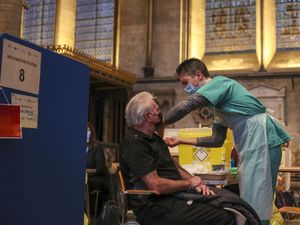Covid-19 vaccine messaging ‘should highlight personal over collective benefits’
Oxford University research suggests one in 10 will not take a coronavirus jab.

Messaging that focuses on personal, rather can collective, benefits of having a Covid-19 vaccine may be the most effective way to convince those hesitant about the jab, study suggests.
Research by Oxford University, which involved nearly 19,000 adults in the UK, has indicated that one in 10 people remain sceptical about getting a coronavirus vaccine.
The study, published in the journal The Lancet Public Health, suggests the most effective way of encouraging those who are vaccine-hesitant is to focus on personal benefits, “highlighting the fact that you can’t be sure, even if you’re relatively young and fit, that you won’t get seriously ill or struggle with long-term Covid-related problems”.
Study leader Daniel Freeman, a professor at the department of psychiatry at the University of Oxford, said: “Much of the official messaging around Covid-19 vaccination draws on the idea of collective responsibility – that it benefits all of us to get the jab.
“For most people in the UK, it’s a message that definitely resonates.
“But for the significant minority of people who remain sceptical about Covid-19 vaccination, another approach may be needed.
“Our study suggests that the best approach now may be putting personal benefits front and centre in media campaigns.”
The researchers analysed the responses of a representative group of 18,885 UK adults who were part of the Oceans III survey (Oxford Coronavirus Explanations, Attitudes, and Narratives Survey).
The participants were randomly asked to read one of 10 texts, each of which provided different information about the vaccines.
Some of these messages included benefits of the Covid-19 vaccine for the society as a whole while others addressed concerns about speed of development and testing.
Rest of the texts focused on the implications for individuals.
The participants completed an assessment of willingness to be vaccinated after reading their allocated message.
Findings showed that the number of people willing to get a Covid-19 vaccine has increased since the national vaccination programme began in the UK last year.
Half of those taking part in the survey said in December that they would get the vaccine as soon as possible, which increased to almost three quarters a few months later.
However, the researchers said nearly one in 10 people remain strongly vaccine hesitant.
Prof Freeman said: “The vaccination programme in the UK has gone well, which has helped to lift vaccine acceptance rates even higher, but vaccine-hesitancy has not disappeared.
“The effectiveness of the Covid-19 vaccination programme depends on mass participation: the greater the number of people vaccinated, the less risk to us all.
“It is therefore crucial that as many people as possible are willing to get the jab.”
Professor Andrew Pollard, director of the Oxford Vaccine Group at the University of Oxford and one the leading scientists behind the Oxford/Astra-Zeneca vaccine, said: “This trial identifies the importance of emphasis on personal benefit of vaccination when discussing the merits of Covid-19 vaccines to improve uptake, but we need also to remember the importance of being vaccinated to protect our families and colleagues from getting the virus from us, the impact on them and the health systems when we become ill with the coronavirus, and the delay in the end of the pandemic, with grave consequences on economies and society, that will be caused by vaccine refusal.”





